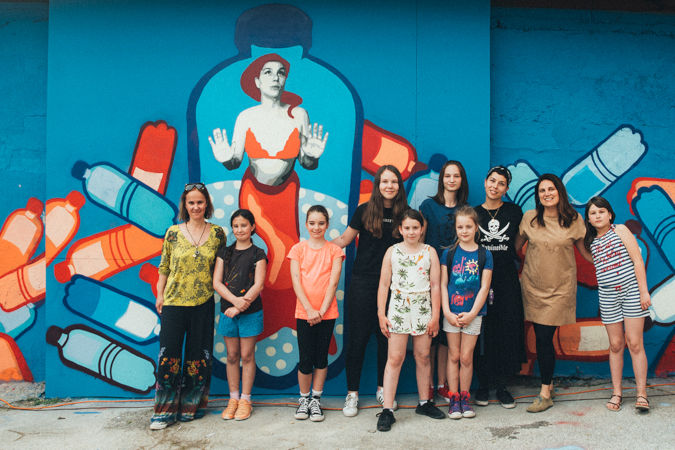Belgrade wall painted in gender equality
Date:

Well-known female street artist in Serbia TKV and a group of young girls jointly painted a wall in the Skender-begova street in Belgrade on 26 May, calling for gender equality and circular economy in a UN Women project supported by the European Union.
Under the slogan, “Be the leader of change in your community,” TKV and the girls aged 10-15 depicted a pop culture icon, Little Mermaid stuck in a plastic bottle, symbolizing wildlife in the ocean suffering from plastic ingestion. The female character also represented a leader of change in her community.
TKV said that the mural is sending a clear message “on the harmfulness on the use of plastics as well as that women and girls are those who can drive the change”. For years, TKV has been using her skills and a spray to create murals and stencils addressing the country’s issues with gender inequality, domestic violence and mistreatment of women.
According to Maja Lalic, creative director of Mikser Festival during which the mural was painted, with small investments in awareness-raising and skills related to responsible patterns of production and consumption, women can be, as many of them already are, the engines and souls of the circular economy and circular culture. “This can happen on all levels, from households and communities to businesses and politics.”
This year, Mikser Festival focused on circular economy and sustainable development as a new culture of living and doing business. Under the slogan “Circulate”, the festival brought together artists, designers, IT experts, urban planners, ecologists, innovative companies, as well as young talents and students, all dedicated to finding models for ensuring a brighter, more humane future.
Milana Rikanovic, head of UN Women in Serbia, said that empowerment of girls and encouraging them to fight for gender equality in different ways were more specific objectives of this action of painting the mural at the festival. “The girls have shown that they are a great team and that they can do anything when they join their forces. On the other side, graffiti art is a perfect example of how a seemingly inconsequential—or half-destructive act—like writing on the wall can actually promote social change by putting together gender equality and circular economy and making it visible on the wall.”
The mural was created within the project “Support to priority actions for gender equality” implemented by UN Women in Serbia with financial support of the European Union.